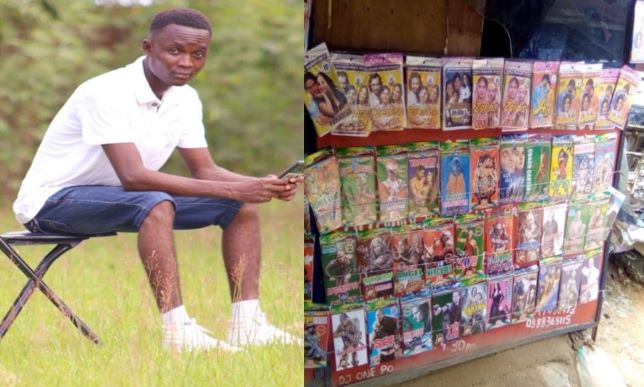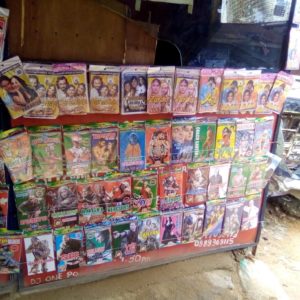
(Last Updated On: May 25, 2021)
PHOTO: DC World Film Director Shadrach Gaye and some apparently pirated films being sold in Monrovia
By William Selmah, [email protected]
A Liberian artist is predicting doom for the movie sector and the entire creative industry unless stern measures are taken to clamp down on piracy and related crimes within the industry.
The Director of the Deboy Creative World (DC World) said the crime is becoming so deeply entrenched that the works of local artists in Liberia are surfacing on the market even before they are released, citing a personal experience.
“I was shock to see my work in some communities while we were still in studio in the preparatory phase to finalize and release the film”, Mr. Gaye revealed.
Not having the luxury of time and cash to fight back, he noted, they never pursued that case.
Under the amended Copy Rights Law of 2016, first offense is punishable by seven years of imprisonment or a minimum fine of LD 300,000.00.
Piracy in Liberia robs not only artists of just benefits from their efforts, but government as well of badly needed revenues, as there is no trace of what pirates reap from duplicating other people’s works.
Shadrach Gaye: “This is totally unfair to us considering the hardship we pass through before successfully producing just a single film. In Liberia, you don’t easily see people with that kind of financial strength coming down to help struggling talents. No. People don’t easily spot and promote talents here. So when we try hard to do something on our own, for God’s sake what belongs to us must not be hijacked. As my sister Kanvee Gains said, pirates are really killing us”.
DC World’s first project: Whom to Work for? (translated from the Kpelleh vernacular), was shot in Croixerville.
The film director wants heavy penalties imposed on those involved in unjustly enriching themselves from the sweat of others as a means of forcing them to desist and as another means, as well, of deterring others.
“Piracy is grave and is not only affecting Liberia. It is a serious global discussion. It is a crisis that is affecting China, America and other countries, and they are all fighting it”, the former President of the Liberia Movie Union Amb. Gregory Artus Frank said.
He explained in an interview that this crisis is of concern to their administration and the entire movie industry and they are not sleeping on it.
“But under the George Weah leadership, we are endeavoring to improve our sector as expected of every other sector. The basic problem we have in Liberia is getting the general public to understand piracy and how it adversely affects the economy in general, and in particular, the entertainment industry”, Amb. Frank said.
He said those involved in the sales of pirated goods were initially given a 90 day notification to clear their shelves following which they along with some representatives of the Liberia Intellectual Property Office (LIPO) obtained a search and seizure warrant to go out into field and begin confiscating the films in question.
But the Movie Union President said at some point, disc sellers appealed through the city court to give them additional time, something that resulted into a two week extension which expired since September 30, 2020.
“So if we go out into the field again and discover they still have the same goods on their shelves, we will return once more to the court for another search and seizure warrant to enable us confiscate them”, Amb. Frank emphasized.
The piracy ring in Liberia, he noted, involves three types of people: the ones that import the films, the ones that stay in their shops and burn or duplicate the films and the yanna boys [hikers] who sell the films on retail basis in the communities or boots.
“The best way to fight this piracy is to start with the people in the shops. If they don’t reproduce, we won’t see to buy”, said Daniel Tamba, a disc retailer in the Bassa Town Community in Paynesville Redlight.
He believes that once they stop burning the discs, the pirated goods would eventually disappear from the market.

Film retailer in Bassa Town, Redlight, Daniel Tamba
Speaking further, Tamba said though he has sold discs for some time now, he still finds difficulty differentiating a burnt disc from an original one.
“For those that burn the films, we have asked them to go to the copy right office and regularize their status, because the copy right office has created the Collective Management Organization (CMO) with the sole aim of protecting the copy rights of other people whose works are being brought into the country, as they are to collect royalties and send same back to those countries. This applies likewise to Liberian contents that are outside Liberia. This is a common global practice”, Amb. Frank explained.
He said further that following the process, those found to have no license would be deemed to be operating illegally and consequently barred from continuing to do business. Disc burners, he continued, are also required to register their machines with the CMO.
The Feedbacks they are receiving, the former Movie Union President noted, speak of non-compliant posture of those concerned; meaning they (union and others) will return to the field to go after them.
But he was quick to clarify that “we are not targeting Nigerians because some people have already begun making such insinuations. Liberians, Ghanaians and other nationals are as well involved in the same business that Nigerians are doing. “So we are not targeting a specific group of people. They’re all my friends and we’ve been collaborating over the years. But when it comes to the right thing being done, it is just prudent that we remain resolved.”

Films (some apparently pirated) on sale in Paynesville, Liberia
Frank said with the level of support they are enjoying from the George Weah government, it will only be a matter of time before piracy is completely subdued in Liberia.
LIPO has in recent years looked into two piracy cases, according to the Director General for Copy Rights at LIPO, Clifford Robinson.
One involved the famous Liberian movie series Malawala Balawala produced and directed by Kerkura Kamara and the other, the Sweet Liberia music by the legendary Zack and Geebah. One of the two cases involving Zack Roberts, according to Mr. Robinson, ended on the negotiating table. The case filed by Kerkura Kamara, he noted, was still ongoing.
“The last thing we want to do to violators is to send them to court”, Robinson said. Under the Copy Rights Law, first offense is punishable by seven years of imprisonment or a minimum fine of LD 300,000.00, considering that the violator may have been acting out of ignorance.
In the event there is a second offense, “there is no compromise because it shall have been proven by then that the culprit has not been acting in good faith”, Robinson said.
“We often seek compromise for first offenses, though there is a general principle in law that ignorance of the law excuses no man”, he pointed out.
Copy Rights Law in Liberia was first enacted in 1911 and re-enacted in 1997 under the Charles Taylor regime.
Under the reign of Ellen Johnson Sirleaf, it was amended in 2016, paving way to merge the Industrial Property Office with the Copy Rights Office in keeping with the Banjul and Madrid Protocols on literary and artistic works.
Pursuant to Liberia’s amended Copy Rights Law, when a person dies, ownership of his or her artistic works goes to his or her next akin for 50 years, following which it goes into public domain.
This story was a Public Trust Media Group collaboration with New Narratives as part of the West Africa Justice Reporting Project.
